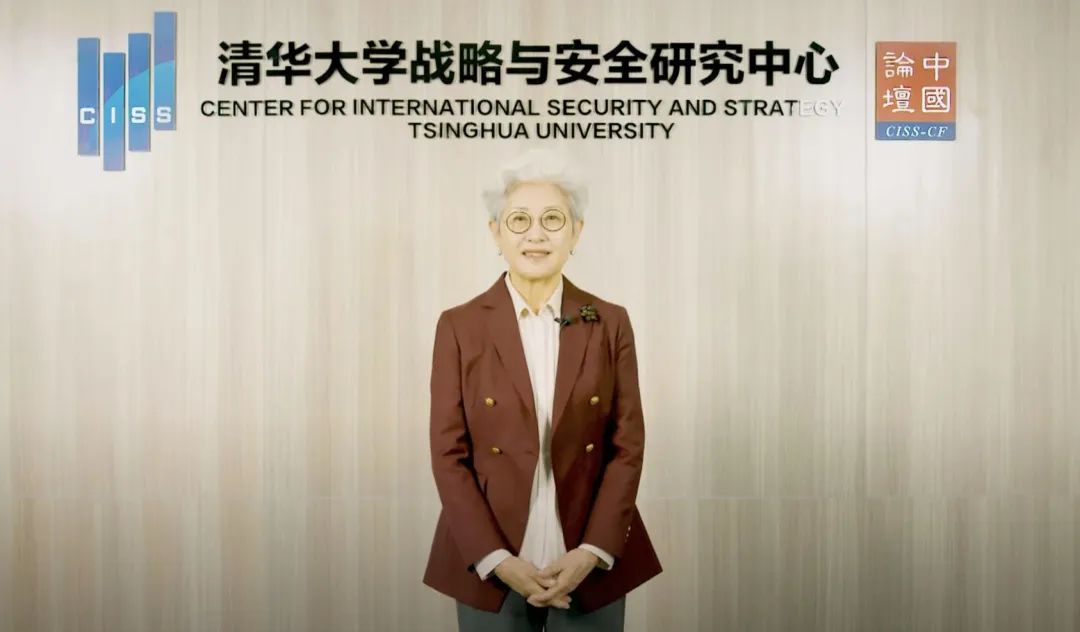
Mme. Fu Ying, Former Chinese Ambassador to the UK
On November 5, Mme. Fu Ying, former Chinese ambassador to the UK, delivered a video message on the international situation at the Global Town Hall 2022 at the invitation of the Foreign Policy Community of Indonesia.
“We’ve started to sense the return of the logic of geopolitics as security confrontation and military conflicts are arising in front of our eyes,” said Fu. Speaking about the current international situation, she warned that the concept of ‘geopolitics’ has again become a frequently used term describing some of the international behaviors in recent years. Europe, for example, is seen as engulfed in a severe geopolitical conflict caused by, to a large extent, a geo-security collision between Russia and the US-led NATO.
In addition to the growing tension in Europe, Fu Ying also touched upon how the US is provoking ‘strategic competition’ with China and how the Asia-Pacific region is also at the risk of returning to the front line of geopolitical conflict.
This ‘geopolitics’-centered logic and discourse warrant our vigilance. During the early stage of industrialization, countries fought for controlling geographic space and access to key resources, and the logic of geopolitics offered the theoretical foundation for expansionism, said Fu Ying. Since territories and resources were limited, expansionism inevitably ran into fights for sphere of influence and zero-sum competition, which even led to wars, hot and cold.
Fu Ying then raised a question: Could we move beyond the geopolitical thinking and keep on building common prosperity? She pointed out that Asia Pacific will probably be the first to make this choice at this major crossroad, to which the rest of the world is approaching. She believes that the majority countries in Asia want to see the momentum of peace and prosperity continue and prefer not to be forced to pick sides, much less to allow the original agenda to shift from economic issues to military and security concerns. Looking back at the recent history of the region, Fu said the success of Asia lies in its commitment to cooperation for common economic benefit while taking the security concerns to the negotiating table, instead of resorting to confrontation. Countries have nurtured a sense of common security, and a network of meticulously intertwined dialogues has been developed here, including those on political and security coordination and on functional cooperation.
“We can call it an ‘open regionalism’ around ASEAN centrality. Indeed, the Asian way of dealing with differences offers a valuable experience for the world,” said Fu. Taking the South China Sea as an example, she noted that this year marks the 20th anniversary of the signing of DOC (Declaration on the Conduct of Parties in the South China Sea), and it is understood that the COC (The Code of Conduct in the South China Sea) is under the second round of text review.
At the end of her speech, Fu Ying called on countries to move beyond the narrow geopolitical thinking and cope with external uncertainties with regional unity, and promote global recovery with high-quality development and high-level cooperation.
On November 4, China’s Foreign Ministry spokesperson Zhao Lijian also mentioned the 20th anniversary of the signing of the DOC when answering a question from The Paper. The 20-year success of the DOC fully shows that China and ASEAN countries have the confidence, wisdom and ability to properly handle issues relating to the South China Sea.
In addition, speaking about recent regional and international political agenda, Fu Ying said that this is a “highlight moment” for ASEAN – with the ASEAN Summit, ASEAN Plus Three Summit and the East Asia Summit due to be held from November 8 to 13 in Phnom Penh, Cambodia, the G20 Summit on November 15-16 in Bali, Indonesia, and the APEC Economic Leaders’ Meeting on November 18-19 in Bangkok, Thailand.
“ASEAN will be able to demonstrate to the world its strong will and capability to unite the region and provide new impetus for post-pandemic recovery,” said Fu Ying.
The Global Town Hall 2022 was held on November 5. Organized by the Foreign Policy Community of Indonesia in collaboration with an international consortium of think tanks from various countries, this year’s Global Town Hall was themed “Sustaining Peace and Development in a Divided World.” At the meeting featuring world leaders and leading minds, global citizens gathered to discuss the most pressing issues in a 15-hour marathon of foreign policy sessions, with the aim of providing an independent and open platform for dialogue among countries on addressing common challenges together.
This article was first published in The Paper on November 5, 2022.
